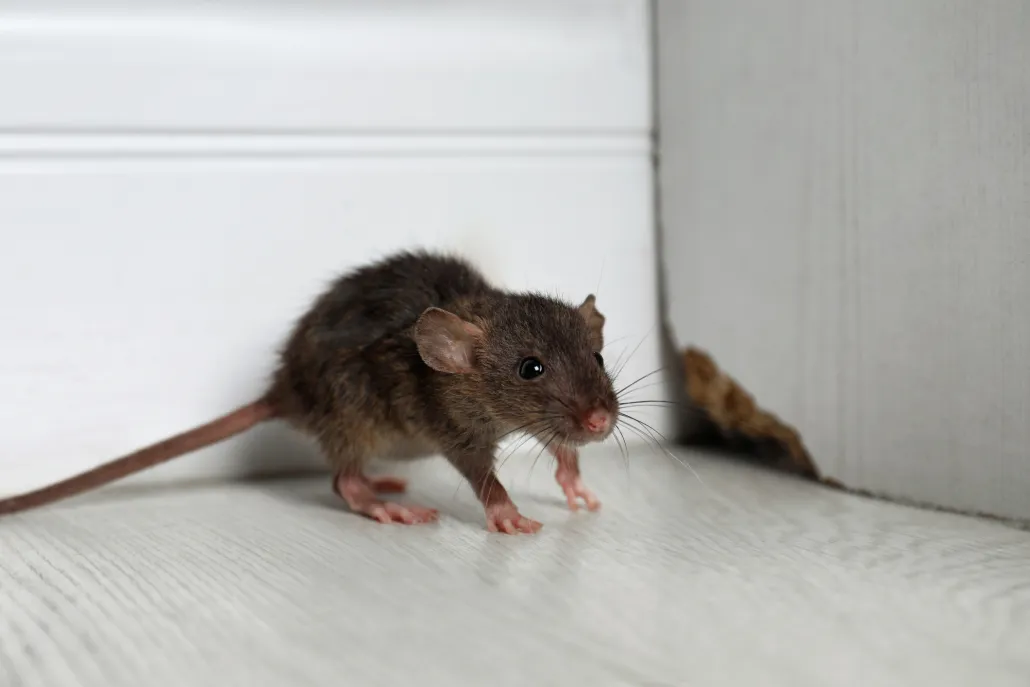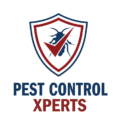Rodent Treatments in Florida
Exterminator Services for Tallahassee, Quincy, Crawfordville
Rodent Control and Rat Removal in Tallahassee, Florida, Pest Control Xperts
Rodents are one of the most destructive and dangerous pests affecting properties in the Florida Panhandle. At Pest Control Xperts, we provide aggressive rodent control and rat removal services for homeowners and businesses in Tallahassee, Quincy, and Crawfordville. While mice are a common nuisance, rats—specifically Roof Rats and Norway Rats—pose a serious threat to the structural integrity of your home. They are known to chew through electrical wiring, destroy ductwork, and contaminate insulation with urine and feces. Tallahassee’s dense tree canopy and older housing stock create the ideal highway for these pests to enter your attic and crawlspace. We prioritize a strategy of total exclusion and population control, ensuring that once we get them out, they stay out. When you hear heavy scratching in the ceiling or find chewed wires, our team is ready to respond.
Rodent Problems We Solve in Tallahassee
Dealing with a rat infestation requires a different approach than dealing with insects or even mice. Rats are intelligent, cautious of new objects (neophobic), and can squeeze through holes as small as a quarter. In our area, the most frequent offender is the Roof Rat, an agile climber that enters homes from overhanging tree branches. Unlike other pests that might just live in the walls, rodents actively destroy the home to build their nests. Our rodent removal process focuses on identifying the specific species and their travel patterns. We utilize advanced pest tracking and inspection techniques to find the “rub marks” and entry points that others miss. We believe in safe pest management that protects your property without putting your family or pets at risk.
Common signs of a rat issue:
- Loud scratching, gnawing, or thumping sounds in the attic at night
- Large droppings (size of an olive pit) found in insulation or along walls
- Grease marks (dark smudges) along baseboards or entry points
- Gnaw marks on door sweeps, wooden eaves, or PVC piping
- Shredded insulation or cardboard used for nesting material
- Ammonia-like smells coming from vents or hidden areas
- Pets appearing obsessed with a specific wall or cabinet
- Burrows or holes dug around the exterior foundation

Types of Rat and Rodent Issues We Handle
Roof Rat Infestations in Attics
Roof Rats are the predominant rodent pest in Tallahassee due to our heavy tree coverage. They prefer to live high up, making attics their ideal nesting ground. They often gain access by running along power lines or jumping from tree limbs onto the roof. Once inside, they damage AC ductwork and trample insulation. Because they are nocturnal and live overhead, infestations can grow quite large before they are noticed.
What we look for during inspection:
- Tree limbs touching or hanging over the roof line
- Damaged soffit vents, ridge vents, or gable vents
- Gaps around chimney flashing or roof returns
- Runways in the attic insulation
How we approach treatment
We focus on “exclusion” first. We seal the upper entry points using heavy-gauge hardware cloth and steel mesh that rats cannot chew through. Inside, we use snap traps placed on their established runways to quickly reduce the population. We avoid using poison in attics to prevent rats from dying in inaccessible areas and causing odor issues.
Norway Rat Control in Crawlspaces
While less common than Roof Rats in our area, Norway Rats are larger, burrowing rodents that stay close to the ground. They are often found in crawlspaces, basements, or burrowed under foundations. They enter through broken vent screens or by digging under the footing. They are aggressive foragers and often rely on pet food or garbage left outside.
What we look for during inspection:
- Burrows or holes in the soil around the foundation
- Broken or missing crawlspace doors
- Gnaw marks on lower door frames
- Signs of digging near utility entry points
How we approach treatment
We implement rodent barrier installation around the base of the home. This involves trenching and installing wire mesh to prevent digging. We also secure trash areas and remove exterior food sources. Trapping is done along the foundation walls where these rats instinctively travel.
Sanitation and Damage Repair
Removing the rats is only half the battle. Rodents leave behind pheromones, droppings, and urine that can attract new pests and pose health risks such as Hantavirus or Salmonella. If the biological mess is not cleaned up, the scent remains a beacon for future infestations.
What we look for during inspection:
- Soiled insulation in the attic or crawlspace
- Urine pillars (accumulations of urine and dirt)
- Droppings scattered on vapor barriers
- Chewed electrical wires that present fire hazards
How we approach treatment
We offer pest sanitation services to disinfect the area. This may involve removing contaminated insulation, vacuuming droppings with HEPA-filter equipment, and applying a sanitizing agent to neutralize odors and pheromones. This step is crucial for long-term pest control and indoor air quality.

Our Rodent Inspection and Exclusion Process
Rodent control is construction-based pest control. We do not just set traps; we fortify your home. Our process begins with a rigorous pest assessment services review. We inspect the entire exterior envelope of your house, looking for gaps around pipes, vents, and eaves. We also inspect the interior, including the attic and crawlspace, to determine the size of the population.
Once we identify the entry points, we perform exclusion techniques for pests. We seal holes using materials that rats cannot destroy, such as concrete, steel wool, and metal flashing. Expanding foam alone is not enough, as rats chew right through it. We utilize integrated pest management to modify the habitat around your home, such as recommending the removal of ivy or dense ground cover where rats hide.
Our trapping strategy is strategic. Rats are smart. If a trap snaps and misses, that rat will never go near it again. We place traps in areas where the rats feel safe, often pre-baiting them to gain their trust before setting the trigger. This ensures a higher success rate and faster elimination of pests.

Rodent Prevention Tips for Tallahassee Homes
Preventing rats is about removing their access to food, water, and shelter. In our humid climate, rats are often looking for water sources as much as food. By tightening up your home’s exterior and managing your yard, you can make your property much less attractive to them.
Preventative steps that actually help:
- Trim tree branches back at least 6 to 8 feet from the roof to cut off their “bridge”
- Cap your chimney and install sturdy screens on all roof vents
- Do not leave pet food or water bowls outside overnight
- Secure trash can lids tightly; rats can chew through plastic if they smell food
- Fix leaky outdoor faucets and AC drain lines that provide water
- Store firewood and lumber on racks off the ground
- Pick up fallen fruit (citrus, pecans) from the yard immediately
- Keep compost bins sealed and located away from the house
- Inspect the rubber seal on the bottom of your garage door regularly
Residential and Commercial Rodent Services
We provide specialized services for both residential homes and commercial businesses. For homeowners, we understand the fear and sleepless nights that come with hearing rats running overhead. We work efficiently to seal your home and remove the intruders so you can feel safe again.
For commercial clients, especially restaurants, warehouses, and food processing facilities, a single rat sighting can ruin a reputation and lead to health department shutdowns. We offer commercial pest services that include exterior baiting programs and interior monitoring stations. Our proactive pest prevention plans are designed to intercept rodents before they enter your facility. We provide discreet service and detailed logbooks to ensure you remain compliant with all regulations.
Professional Rat Extermination vs DIY Methods
Many property owners try to solve rat problems with over-the-counter poisons or sticky traps. These methods are rarely effective for established infestations. Rodenticides sold in stores can be dangerous to wildlife and pets if not used correctly. Furthermore, if a rat eats poison and crawls into a wall void to die, the resulting odor can last for weeks and is impossible to remove without cutting into the wall. Sticky traps are generally considered inhumane and are ineffective against large adult rats.
Professional rodent extermination involves a deep understanding of rat behavior. We know that rats are neophobic (afraid of new things), which is why standard trapping often fails for homeowners. We use professional-grade mechanical traps that kill instantly and humanely. Most importantly, we have the tools and materials to perform proper exclusion. Sealing a roof return or a foundation vent requires skilled labor and the right materials. We solve the root cause of the problem—the entry points—rather than just treating the symptom.
Frequently Asked Questions About Rat Control
Do you provide rat removal in Tallahassee and nearby areas?
Yes, we serve the entire Tallahassee metro area, including Quincy and Crawfordville. We are experts in handling the Roof Rats and Norway Rats common in our region.
How do I know if I have rats or mice?
Size is the main difference. Rat droppings are large (1/2 to 3/4 inch), blunt at the ends, and look like capsules. Mouse droppings are small and pointed. Rats are also much louder when moving in the attic.
Why are rats in my attic?
Attics provide a warm, dry, and safe shelter for rats, especially Roof Rats. The insulation makes excellent nesting material. If tree branches touch your roof, your attic is their first stop.
How long does the removal process take?
Exclusion (sealing the home) is usually done in one or two visits. Trapping out the population inside can take 2 to 4 weeks depending on how many rats are present. We monitor the traps until activity ceases.
Is the exclusion work guaranteed?
We stand by our workmanship. We use durable materials designed to withstand weather and gnawing. We will discuss the specifics of our service coverage during your inspection.
Are the treatments safe for my dogs and cats?
Yes. We prioritize mechanical trapping inside the home, placing traps in areas pets cannot reach (like attics). If exterior bait stations are needed, we use tamper-resistant boxes that pets cannot open.
Do you clean up the droppings?
Yes, we offer attic restoration and sanitation services. Cleaning up the waste is important to remove health hazards and the pheromones that attract other rats.
Is there a local rat exterminator near me?
If you are in Leon, Gadsden, or Wakulla counties, Pest Control Xperts is your local provider. We are nearby and ready to help you secure your home.
Service Area for Rodent Control in and Around Tallahassee, Florida
We are proud to serve the homes and businesses of our local community. Our service area covers the capital city and the surrounding rural towns where rodent pressure is often high due to the wooded environment.
- Tallahassee
- Quincy
- Crawfordville
- Midway
- Havana
- Woodville
- Wakulla Springs
- Miccosukee
Local service means we can respond quickly to your needs. We understand the urgency of a rodent problem and are committed to protecting your property from damage.
Zip codes we serve: 32301, 32303, 32304, 32308, 32309, 32310, 32311, 32312, 32317, 32327, 32351
